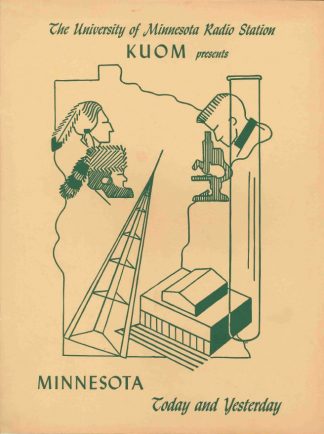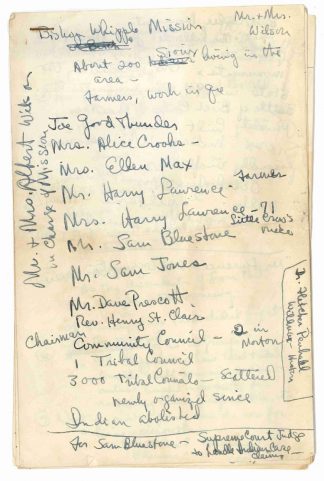University Archives continues the theme of Native American Heritage on our podcast this week, wrapping up November with a bit of documentary from 67 years ago.
In honor of the Minnesota Territorial Centennial, KUOM produced the program Tales of Minnesota which covered various topics of Minnesota history, including the Sioux Treaty of 1851. The particular episode we’ve chosen to highlight narrates and reenacts an interpretation of the events around the signing of the Treaty and the frustrations that lead to the Dakota War, or the Sioux Uprising, of 1862.
The program also included a contemporary component with a documentary unit of KUOM traveling around the state to complete interviews related to the historical topics. The second half of our podcast episode is dedicated to their visit with the Mdewakanton community in Morton, Minnesota. You can listen to the episode in the browser here and read the script below.
Podcast (umnradio): Play in new window | Download
Episode 3: Native American Heritage with the Sioux Treaty

Cover of bulletin for Tales of Minnesota and University Reports to the People, 1949. The University of Minnesota Radio and Television Broadcasting records, University Archives
You are listening to U of M Radio on Your Historic Dial podcast and this is episode 3: Native American Heritage with the Sioux Treaty.
Hello! Karen here at University of Minnesota Archives and today we are continuing our theme around Native American Heritage Month with an episode of the Tales of Minnesota. This program was in celebration of Minnesota’s territorial celebration. In fact, it was broadcast in 1949, the Territorial Centennial, but the announcer says a century and half of history because the program includes stories of explorers and pioneers that came before. Tales of Minnesota in total was 13 episodes on a variety of Minnesota history topics from Flour Milling to the Hinckley Fire of 1894 to Scandinavian Immigration and more. Today we focus on the Sioux Treaty. The narrator begins by describing the atmosphere leading up to the treaty.
The format of the program was a mix of narrated historical documentary with reenactments by the University Radio Guild followed by contemporary interviews or discussions. In the interest of keeping our podcast episodes more concise and the availability of these full half-hour episodes online soon, I wanted to focus more on highlighting the contemporary interviews at the end of this program. However, I would be remiss to not include at least a glimpse of the reenactments done by the Radio Guild and to discuss the stereotypes used within the dramatization. These segments present a startling disconnect between the Guild’s racial caricature of Native American speech and the program’s overall interest in highlighting historical mistreatment, reparation attempts, and the contemporary culture’s progress. Here we will listen to the Guild’s interpretation of Little Crow, followed by their reenactment of Red Iron speaking to the Native American tribes after the presentation of the treaty.
The narration and reenactments continue with the signing of the treaty as well as a second paper, known as the Traders’ Paper, not translated or discussed at the meeting which held the Native Americans to a large debt created by only few individuals of the tribes for over 200,000 dollars owed to a few traders. The years that followed included selling more of their already small reservation land and remaining deep in debt. On top of that, a string of harsh winters did not provide good farming crops and purchasing provisions from settlers led to more debt.

Notes on people interviewed in Morton, 1948. University of Minnesota Radio and Television Broadcasting records
The rest of the program is Northrop Dawson discussing the attempts at reparations by the government and clips from the documentary unit’s trip to Morton in October of 1948. Here they visited one of the few remaining Sioux Settlements in Minnesota and talked with members of the community, providing an authentic voice not heard in the dramatizations. Sam Bluestone and Harry Lawrence describe the abundance of game before the arrival of settlers, the adjustment of the Sioux to farming, the Reorganization Act of 1934, and the future hopes of the Sioux with the Indian Claims Commission of 1946 and opportunities for community leadership.
Tales of Minnesota along with The University Reports to the People, a program we didn’t hear today, came as a result of KUOM feeling a responsibility to share more widely across the state with its unique educational purpose and University resources at hand. Through a statewide program service, they made the state’s history and the current events of the University available free of charge to 20 stations in Minnesota. Stations as far-reaching as Albert Lea, Mankato, Willmar, Fergus Falls, and Duluth, just to name a few.
That’s all for this episode. I look forward to listening in with you next time on one of our earliest digitized programs! Thanks for tuning in!
The U of M Radio on Your Historic Dial podcast is produced every other week for your enjoyment. Subscribe or download on iTunes or GooglePlay so you don’t miss another moment of historic Minnesota radio.
If you enjoy our clips and want to hear or learn more, go to www.lib.umn.edu/uarchives, and search KUOM in the collection guides.
Digitization of University Archives recordings was financed in part with funds provided by the State of Minnesota from the Arts and Cultural Heritage Fund through the Minnesota Historical Society.
—Karen Obermeyer-Kolb is a project archivist for the University of Minnesota Archives. Learn more about the University of Minnesota Archives.




